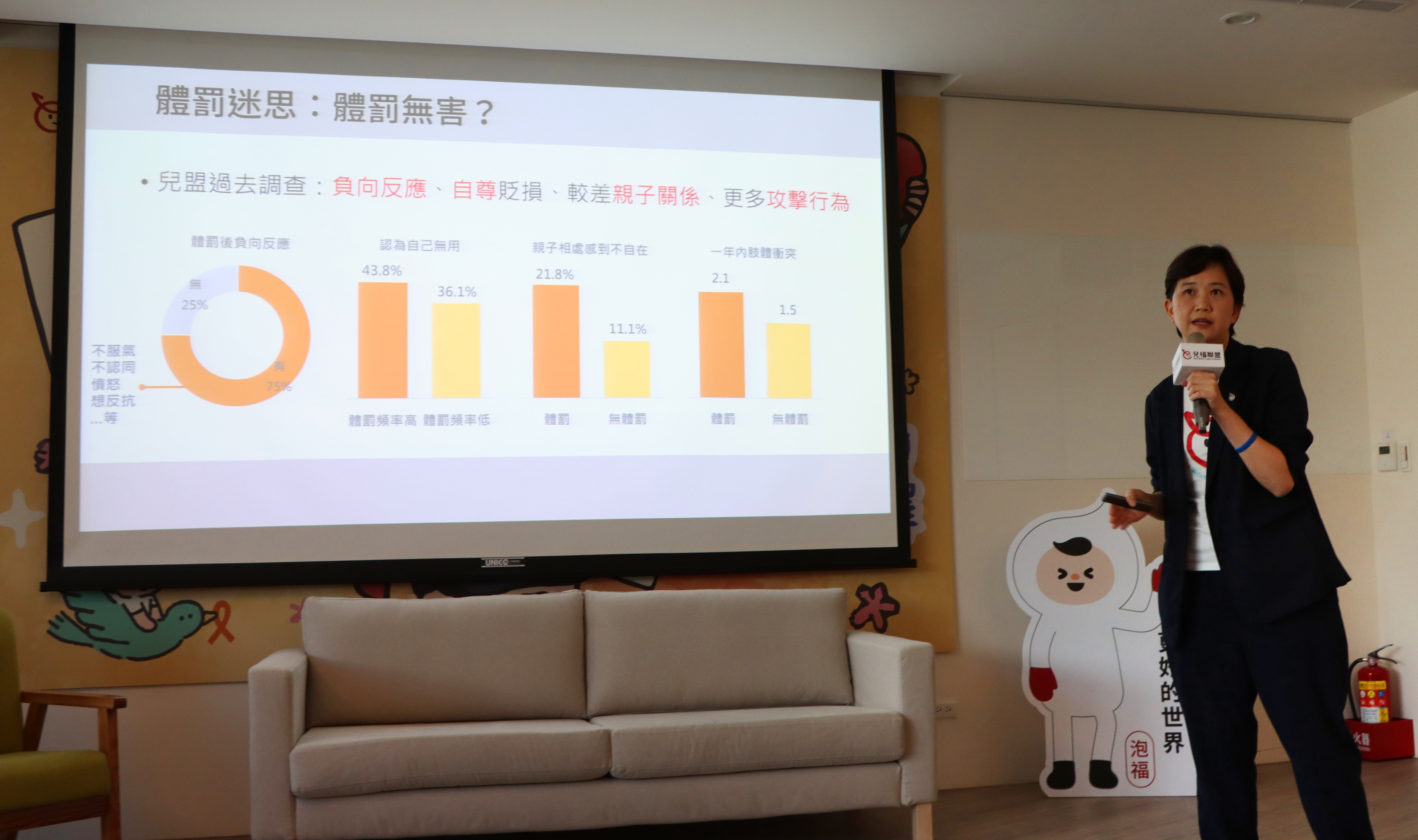
Attitude Towards Corporal Punishments in Taiwan︱Orange Ribbon Child Abuse Prevention Event
Over 60% of parents discipline children with corporal punishment, Orange Ribbon Child Abuse Prevention Action advocacy ongoing
“I grew up being spanked and scolded” seems to be a common memory passed down from generation to generation. According to the “2022 Taiwanese’s Experience and Attitude towards Corporal Punishment”, a survey delivered by CWLF, more than 63% of parents have disciplined children with corporal punishment; in addition, 62.6% of parents had the experience of disciplining children with verbal violence, which includes violently threatening (52.5%), scolding children loudly in public places (36.8%), or using derogatory discipline (18.5%).
CWLF Director Huang Yun-Hsuan elaborated on the major purpose of continuing the “Orange Ribbon-Love Children Zero Violence Action”. The primary cause of child abuse in Taiwan has always been improper discipline. Out of 10,809 abuse cases last year, 3,189 abusers did out of being “accustomed to corporal punishment or improper discipline”, a number accounting for nearly thirty per cent (29.5%). To prevent more child abuse deaths, starting in 2014, echoing the “Orange Ribbon Action” initiated by children in Japan, we hoped to raise awareness among the public on child protection and abuse prevention through continuous appeals and actions. Years after, child abuse continues to occur. Except for continuing advocacy of strengthening the parenting support services to parents with infants and young children in regard to primary prevention, we also expect to overturn the physical punishments by parents in the name of “discipline”, to change the traditional concept of “Spare the rod; spoil the child”, or “Education with rods makes the dutiful son”, and looking forward to giving children a zero-violence growing environment through a change from the parenting method at home.

Almost half of the people disagreed with zero-violence disciplining, misconceptions among society about corporal punishment being necessary, effective, and harmless remain
CWLF conducted an online survey of 1,025 people and discovered that even though the proportion of parents who physically punish children does not seem high, further interviews with those parents revealed that most of them considered corporal punishment “necessary”. Over thirty per cent of parents (30.6%) agreed that corporal punishment is necessary when raising a child; a nearly quarter of parents (24.8%) believed that not sorting to physical punishment would spoil the child. Nonetheless, the survey showed that nearly twenty per cent of people consider corporal punishments effective, for instance, 24.2% of parents think that punishments can prevent children from making similar mistakes; 23.6% of parents believe punishments would teach children to respect them; 23.5% agree that children’s performance better in long term; 18.4% consider corporal punishment is effective when teaching children about responsibilities and in the character formation process; 17.9% think that corporal punishment would teach children to respect others, and 16.4% of parents regard to hitting children as a more efficient way of parenting. In particular, the survey also found that 24.7% of parents stated from their observation and personal experience that “many people grew up with the experience physically punished, it seemed not causing any bad consequence”, therefore they believe that corporal punishments will not cause any harm.
Physical punishments are not only ineffective but result in mental traumas, and even jeopardise the establishment of parents-children relations
Are corporal punishments really effective and necessary? According to the US. American Academy of Pediatrics (AAP), the definition of effective discipline has to meet children’s age and development, able to help children self-discipline, prevent children from being injured, improve their cognition, social emotion, and executive abilities, along with other abilities, or strengthen the behaviour patterns taught by their parents. AAP pointed out directly that corporal punishments are dangerous factors to children’s development (Sege et al., 2018). A study published in The Lancet journal indicates that corporal punishments do not make positive outcomes regarding children’s development, there was no correlation between punishments and children’s ability to focus, cognitive ability, relationship with others, and the ability to respond to stress (Heilmann et al., 2021).
A previous study from CWLF discovered that when parents sort to violent methods to make children comply, the children would have many negative reactions of anger, dissatisfaction, disapproval, and resistance (2018, 2019). Moreover, corporal punishment by parents leads to several negative mental effects on children, for instance, derogation of self-esteem; higher scores of trauma intrusion symptoms (CWLF, 2020); poor parents-children relationships and interpersonal relationships (CWLF, 2021); lower subjective happiness, a higher sense of identity to violence, and more aggressive behaviours (CWLF, 2018). In recent years, many large-sample, longitudinal, retrospective, and meta-analysis studies have also consistently shown that corporal punishment has a negative impact on children's physical and mental health (Gershoff & Grogan-Kaylor, 2016; Cuartas et al., 2020, Ward et al., 2020; Heilmann et al., 2021).90% of parents felt regret or guilt after conducting corporal punishment on children
Corporal punishment and verbal violence bring many inestimable and long-term negative consequences to children, but the most direct and instant reflection is the damage to the parent-child relationship. In the survey conducted by CWLF, around ninety per cent (90.9%) of the parents expressed regret and owed after corporal punishment or reprimanded their children, and hope to reconcile with their children afterwards (91.9%). Almost all of those parents (98.6%) had taken practical actions for reconciliation with their children, such as actively starting parent-child conversations, hugging, apologising, cooking delicious food, etc, attempting to break the deadlock and repair the damaged relationship with their children.
In some situations when most people consider it necessary to sort to corporal punishment, very likely they were not aware that there are other ways to discipline the child. CWLF encourages parents to attempt various methods to restore the damaged parent-child relationship due to corporal punishments. However, “correcting behaviour” is also important when comes to repairing the relationship, in order to avoid falling into the cycle of punishment - regret and owed - reconciliation, and punishment again, the cycle which might destroy the trust in the parent-child relationship. Hence, we would urge parents to beware of the possible harm of corporal punishment on children, open a dialogue, understand the child’s thoughts, stop sorting discipline into punishments, and practice effective and positive parenting strategies.

Switch position and you would know that nobody wants to be treated violently, so do children
Director Huang expressed that the CWLF “Orange Ribbon Child Protection Action” is welcoming its 12th year, we not only urge parents not to conduct physical punishments but also invite other experts to share more knowledge and experience of positive parenting, or provide parents with more useful parenting methods to replace using corporal punishments or violence. To our excitement, throughout years of advocating, the overall percentage of parents using corporal punishments has decreased. For instance, the percentage of people who consider “corporal punishments necessary in parenting” has decreased from the 44.9% in the year 2014 to 30.5% in 2022; of people who believe “spanking is a relatively effective method to discipline children” dropped from 22.9% in 2014 to 16.5% in 2022, and the percentage of people who do not agree with corporal punishments and consider “under no circumstances one should spank children” (zero corporal punishments) has risen from 37% in 2014 to 53.6% this year; of those who think “corporal punishment is violence, no matter how slight it was” has risen from 46.6% in 2014 to 73.1% in 2022, obviously after years of advocating, people’s perspective toward child protection is progressing, attitude to corporal punishments is changed and becoming more opened-minded. This is the result of CWLF and other NGOs in the years of work on child protection and child rights advocacy, and it also brings a new opportunity to promote related bills to protect children from corporal punishments and any violence.
This year’s “Orange Ribbon – Love Children Zero Violence Action” lets parents feel the physical and mental trauma of a child when being physically punished and scolded. CWLF for the first time launched its VR immersive parenting experience video “Swapping Places to Choose” (https://reurl.cc/4XQ4lv). As you enter the official website of the Orange Ribbon event, you can choose to experience the parent-child scenario from either the perspective of the adult or the child. Adults can empathise with the situation you used to think “spanking is caring, scolding is loving”, and understand how a child could be traumatised in the situation; children can feel how their parents felt in the conflict situation, through “switching thoughts” to empathise and mutually understand. At the press conference today, Kim (Jing-Ye), the father of the influencer couple “Nico&Kim” attended with his daughter Nini and personally experience the VR video “Swapping Places to Choose”, he also shared his experience of getting along with children and his thoughts on parenting, told us about his tips of how he effectively communicated and disciplined with children when they made mistakes without harming the harmony of the family and parent-child relationship. There are still many Taiwanese holding the myth and obsolete concept of corporal punishments, CWLF urges the society:
- Face up to scientific evidence and beware of the harms of corporal punishments
In recent years , many large-sample, longitudinal, retrospective, and meta-analysis studies consistently show that corporal punishments negatively impact children physically and mentally. Parents are encouraged to be aware of the harm, start using conversations to understand the children’s perspective and try to stop using physical punishment to discipline their children.
- Repair the parent-child relationship and try positive parenting
Parents inevitably lose control of emotions or sort to corporal punishments to solve their parenting issues quickly. CWLF encourages parents to use various methods to restore the damaged parent-child relationship caused by corporal punishments. However, we also remind that “correcting behaviour” is also crucial for the recovery of the broken relationship, otherwise one could fall into a cycle of punishment – regret and owed – reconciliation and punishment again, which may further ruin the trust in the parent-child relationship. There are many positive and effective alternatives to physical punishments, and parents are encouraged to practice using effective positive parenting strategies. It is also available to seek professional resources for assistance, such as the Call-In parenting hotline (0800-532-880) of CWLF, to cultivate a positive parental responsiveness.
- Legislate to protect children and reject treatments of violence



